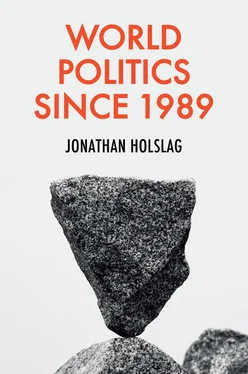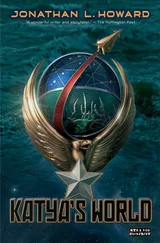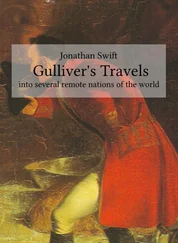A history of world politics cannot be about external politics alone. Some theorists insist on a clear separation between external and internal politics. Kenneth Waltz, an influential thinker about international relations, stated that it is not domestic politics that shapes the behavior of states, but the world system. 11Whatever the culture, the values, or the constitution of states, he argues, they are forced by the behavior of others to defend their interests. This argument is similar to what I refer to in this book as the school of strife. Russia in the 1990s, for instance, had an interest in replacing the antagonistic policy toward the West with a policy of accommodation and integration. Yet, distrust and a lack of interest on the side of the West, combined with latent nationalism, forced it back to battle modus. The same happened to China. Still, instead of seeing the world as an engine, controlled by mechanical laws, it is indispensable to examine the internal dynamics that help understand why some countries grow their power and why others lose it, what mediates their response to external challenges, in terms of institutions, values, public expectations, and so forth. It adds nuance and clarifies why the seemingly predictable mechanics of certain thinkers does not always work out so predictably.
A study of world politics must give a place to non-state actors: to cities, companies, nongovernmental organizations (NGOs), and opposition movements. States remain immensely powerful actors, but the understanding of their interaction with large companies and international organizations is critical. In the next chapters, for instance, we will discover how Western multinational companies detached from their home market, how they still influenced politicians to adjust their foreign policy regarding international economics, and how this contributed to the altering balance of power between countries. But we also explore how countries like China and Russia clung to state capitalism. They forced large domestic companies to serve the national interest and twisted the arm of Western investors to do the same. Hence, the same large companies that influenced the government in one country were influenced by the government in another country.
This instantly explains why experts have remained trapped in an unproductive debate about who influences whom. 12Influence went in both directions. The one country whose prosperity led it to ignore economic security allowed itself to be influenced by the multinational. The other state whose vulnerability made it put economic security upfront, insisted on preserving influence over the multinational. The same ambivalence applies to international organizations, like the United Nations, the World Trade Organization, and the World Health Organization. 13While they have some autonomy with regard to states, and states sometimes find multilateral cooperation a relevant way to shore up their legitimacy in the world, these organizations atrophy when powerful states are no longer capable of brokering a mutually beneficial compromise through them. Multilateralism remains power politics by different means.
When Russia gained control over the Crimean Peninsula and staged a proxy war in Eastern Ukraine, newspapers and military staffs suddenly underlined the importance of gray zone conflict or hybrid war. 14Both concepts imply that states confront each other just below the threshold of a full-blown war. An American general summarized the challenge thus: “We can still win any war, but we have difficulties with anything short of war.” 15In this book, it becomes clear that world politics is always a gray zone. The difference between civilian and military actors is seldom clear. China built merchant ships sturdy enough to carry tanks and used small fishing boats to assert territorial claims. There were many examples of states going guerrilla. Iran supported proxies throughout the region and let them launch missiles against adversaries. Russia paid Afghani fighters to kill American soldiers. China’s inducing of foreign companies to give up technological secrets was a very effective way to alter the balance of power and also to make its military stronger. Hybrid and gray are intrinsic to world politics. But, because of technology, the possibilities of information warfare exploded.
Hybrid wars relate to information wars. 16A clear example of information war concerns the Russian interference with the American elections in 2016. Moscow used social media to spread fake news and to support its favored presidential candidate. But information wars were often more subtle. Authoritarian regimes from the Gulf conducted a permanent campaign against Western societies in order to be seen as trustworthy partners. In international meetings, like the World Economic Forum, they smoothly intermingled with leaders from the West. Through sponsorship of sports clubs, “Emirates” and “Qatar” became brand names. China first pursued a refined public diplomacy to showcase its peaceful intentions and went on to propagate a modern variant of the romantic ideal of the old Silk Road. During the corona pandemic, it tried to profile itself as a savior to other countries.
The battle for hearts and minds can be studied with an eye on the perpetrator, its intentions, and its means. At least as important is to clarify why Western societies were sensitive to misinformation and propaganda. In that regard, the book highlights the importance of the neglect of civic education and fickle patriotism. There was a lot of flag waving in the West, yet few genuine efforts to make citizens understand the risks of authoritarianism, the history of dictatorship, and the sacrifices paid to fight it. Hence, while officers in the armed forces received larger budgets to conduct information war and dedicated government institutions were set up to counter fake news, Western society remained mellow at the core. It was hard to win an information war, when citizens were not dedicated to the truth.
What, then, is the stance of this work toward other allegedly new issues in world politics? Has the age of globalization not genuinely reshaped world politics by making citizens more aware of themes such as the environment, climate change, cyber security, and migration? Thinking about international politics, like thinking in general, is partially contingent. Theory evolves as also the world evolves. Yet, caution is due when it comes to considering themes to be new. The impact of the environment on political stability attracted the attention of kings and thinkers already in ancient times. Cyber security is obviously a new phenomenon. But the struggle for information dominance, whether through messenger networks or the telegraph, has been a perpetual concern. Migration is another issue that has occupied officials and thinkers throughout the centuries, their responses oscillating between openness and disdain for the alleged barbarians. The form changes, but the issues are not entirely new. Environmental change, migration, and technology have shown their capacity to make societies flourish and suffer many times in the past. This is not to downplay their importance, but rather to steer clear of a tendency for exaggeration. There certainly exist perennial forces that shape politics, like the desire of most men and women to settle in a place where it is good to live and to defend that place against outsiders. Some call that the power of proximity, others the pull of provincialism. Only a minority of the world population is cosmopolitan and that makes centrifugal forces powerful.
Readers who expect to find simple critiques will be disappointed. This work identifies flaws of the past generations of political leaders, but also stresses that citizens easily surrendered politics to a class of professional election campaigners. Citizenship hence was reduced to going to vote once every few years and bitterly complaining about their elected politicians in between. Some intellectuals called for participatory democracy, but have citizens truly become ready and willing to participate? This book confirms the crippling gap between poor and rich, the excesses of capitalism, yet also stresses that many who did not belong to the jet set showed the same profit-maximizing behavior at a more modest scale. Lower income groups refused to match their indignation about inequality with action. 17Instead of supporting the small entrepreneur, they made the giants bigger. Joe sixpack exploited the lack of transparency of globalization, the invisibility of exploitation and abuse, as eagerly as the Wall Street shark. I would bet that if we gave citizens a basic income, as some suggest, they would still spend it on the same multinationals, watch the same billionaire soccer players. If one only applies ethics on the income side and not on the expenditure side, can we expect the economy to become better? Or take the criticism about China. The reader will discover the cunning statecraft of China. Instead of blaming China for the economic problems in the developed world, however, this book explains how Beijing essentially aligned its own policy that focused on industrialization with Western governments that were primarily concerned about consumption.
Читать дальше

![Деннис Лихэйн - Когда под ногами бездна [Since We Fell ru]](/books/25722/dennis-lihejn-kogda-pod-nogami-bezdna-since-we-fe-thumb.webp)










